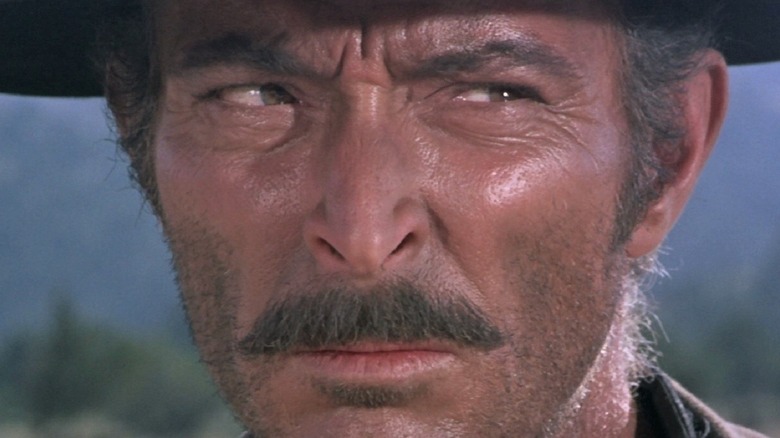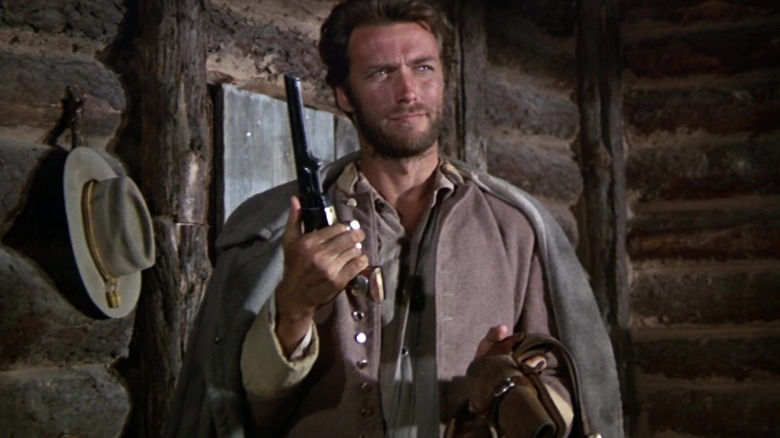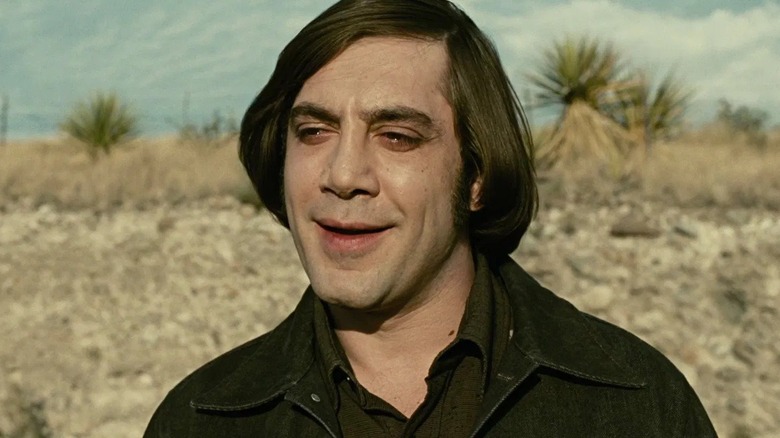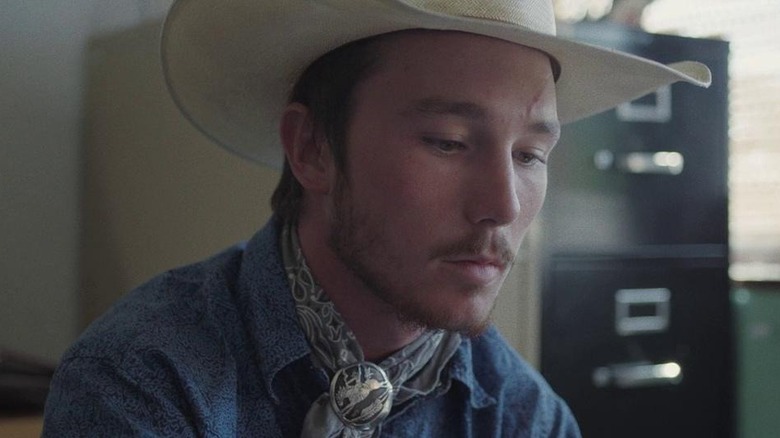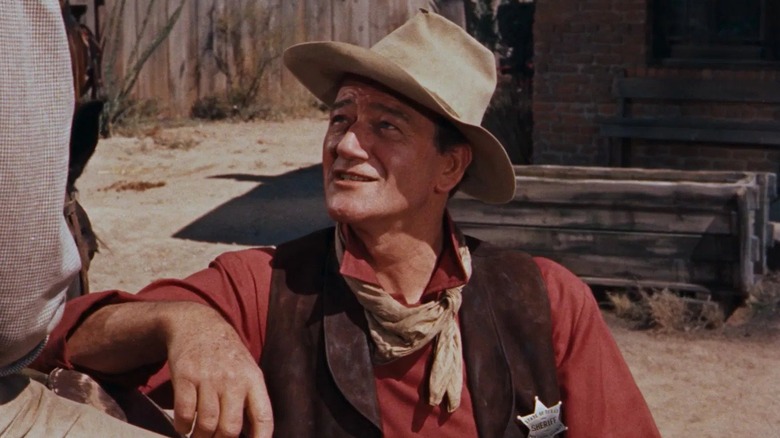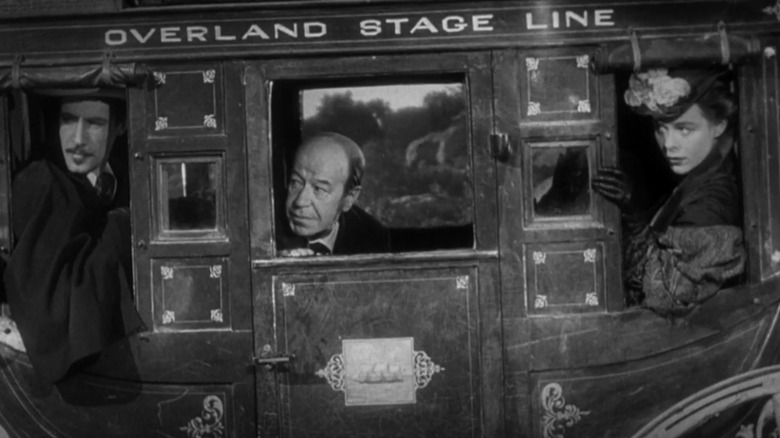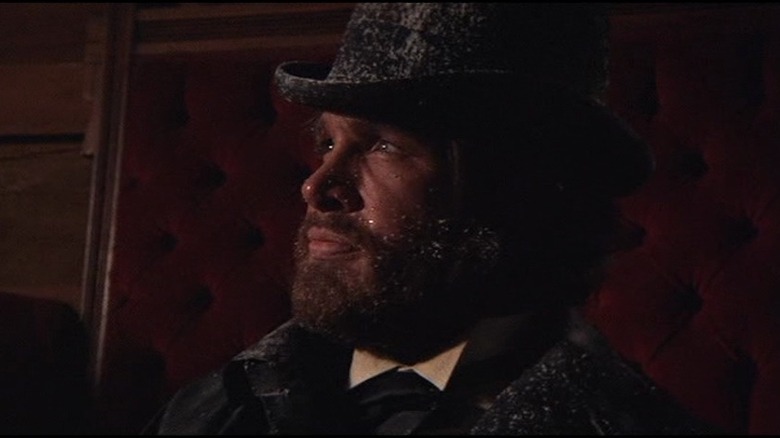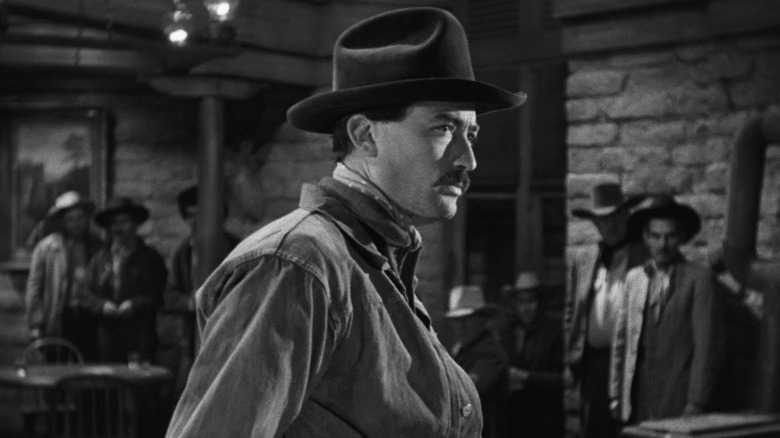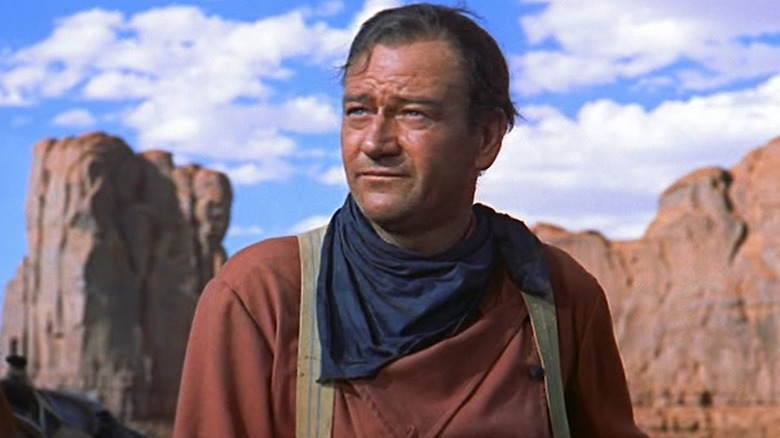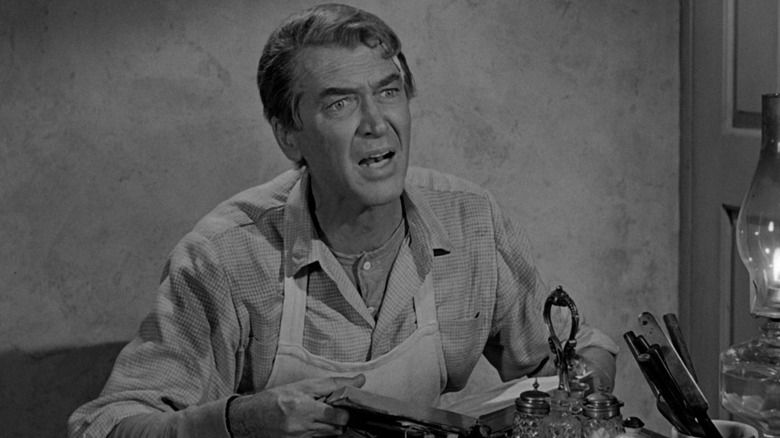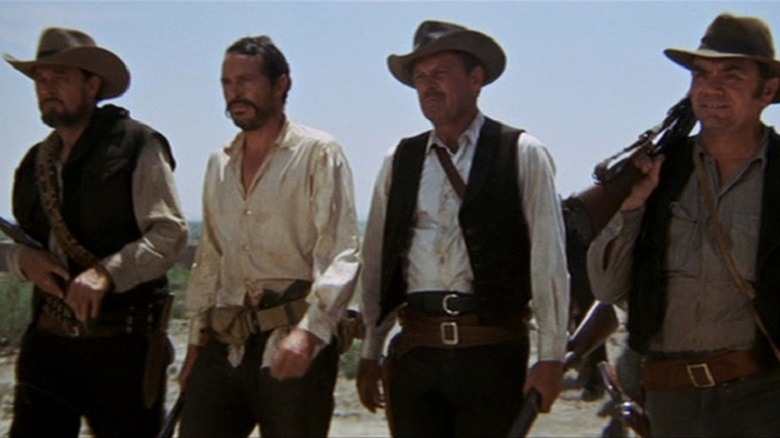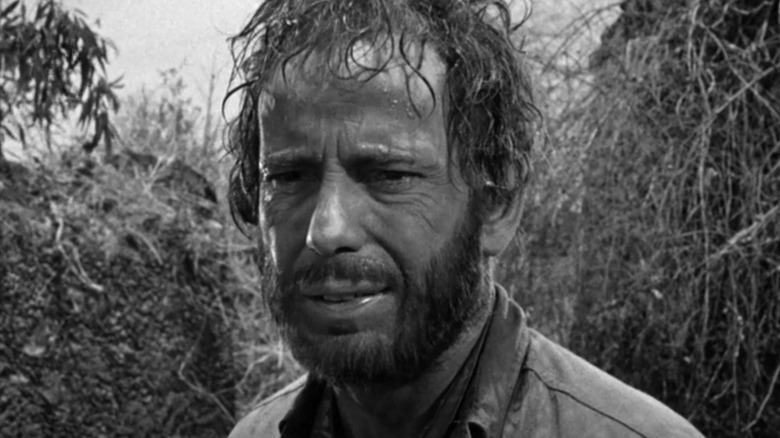There Are Only 11 Near-Perfect Westerns According To Metacritic
Westerns might go in and out of fashion, but they never disappear completely. They can't — even if it doesn't look that way at first glance, they're too versatile to ever go completely out of style. The best Westerns can give us nuanced, exciting takes on history, myth, and even the here and now. They excel at providing both high stakes and breathtaking landscapes. And they're constantly being revisited and revised, tweaked by new interpretations and new points of view.
Any fan can come up with their own distinctive list of favorites, but if you just want to brush up on the classics and get a look at the best the Western has to offer, we've got you covered. Using the rankings on Metacritic, we've narrowed our focus to all the Westerns with a Metascore of 90 or higher. The result is a spectacular list of films that perfectly showcases why people keep coming back to the genre of cowboys, bandits, shootouts, and dusty small towns. Lighthearted, melancholy, cynical, intimate, or epic — whatever you want, it's here. These are the 11 near-perfect Westerns according to Metacritic.
The Good, the Bad and the Ugly
Spaghetti Westerns reached new heights with "The Good, the Bad and the Ugly," Sergio Leone's epic 1966 story of three gunfighters on the trail of some Confederate gold.
Leone had pioneered Italy's run of stylish, stark, yet grandiose Westerns with the great "A Fistful of Dollars," which set up Clint Eastwood as the Man with No Name – a lone and unpredictable antihero who was good with a gun and always on the move. In "The Good, the Bad and the Ugly," he's back — and not even nicknaming him Blondie can hide how dangerous he is. The tension runs high as Blondie forms a wary partnership with bandit Tuco (Eli Wallach) to go after the gold. They might betray each other ... or they might run afoul of the cruel, capable Angel Eyes (Lee Van Cleef), who's also on the trail.
"The Good, the Bad and the Ugly," Roger Ebert notes in his four-star review, is, like all Leone's films, a "heightened dream in which everything is bigger, starker, more brutal, more dramatic, than life." The result is a movie as hauntingly beautiful as it is violent. It serves up both a mythic American West and one that's stripped of all the old-fashioned lore of good guys and their white hats. It's a genre-defining film that absolutely deserves its 90 on Metacritic.
No Country for Old Men
Released in 2007, "No Country for Old Men" has a 91 on Metacritic, and it definitely deserves its place in the top-ranked Westerns. The Coen brothers go especially dark for this tale of stolen drug money, violent times, and the forces of chance and fate. The movie pulled in an incredible Oscar haul, taking home statues for Best Picture, Best Director, Best Supporting Actor, and Best Adapted Screenplay.
The story is a film noir plot set in a Western world. Llewelyn Moss (Josh Brolin) is out hunting one day when he stumbles on the grisly aftermath of a shootout — and a briefcase full of cash. He takes it ... and that decision changes everything. Enter the terrifying, off-kilter Anton Chigurh (Javier Bardem), a hired killer who's supposed to retrieve the money and who's so ruthless and violent in pursuit of it that his own employers regret bringing him in. Trying to make sense of it all is the weary Ed Tom Bell (Tommy Lee Jones), a sheriff who's seen just about all he can stand but who will have to see this horror all the same.
"No Country for Old Men" is bleak, funny, and deeply memorable, especially for its villain. With his bowl haircut, air-pressure bolt gun, and insistence on high-stakes coin flips, Chigurh instantly became an icon. The Guardian's Peter Bradshaw praised the film as a "dark, violent and deeply disquieting drama" with "all of it hard and sharp as a diamond."
The Rider
If you missed "The Rider," there's never been a better time to check it out — director Chloé Zhao's Oscar win for "Nomadland" and her MCU movie "Eternals" gives you a great excuse for revisiting her backlist. And you'll have the benefit of hitting on one of Metacritic's top Westerns, with a Metascore of 92.
"The Rider" is the story of Brady (Brady Jandreau), whose life on the pro rodeo circuit is cut short when an accident — a horrible hazard of his profession — leaves him with a brain injury that causes seizures. He's not supposed to ride again. A lot of movies would follow an inspirational sports movie template and end with Brady back at the height of his powers, but "The Rider" is more restrained and realistic. Instead, we follow Brady's struggle to adjust to falling back into a life of limited options and even less glory. He may decide to ride again, but what will it cost him?
Film critic Godfrey Cheshire notes that the documentary-like realism is one of the film's strengths. What you're seeing, from horse-training to trauma to friendship, is often real. Zhao handles all of this delicately, with both empathy and respect. As Cheshire puts it, her approach is "deeply humanistic, founded on a compassionate realism that honors the heartfelt struggles of all the creatures it encounters." It's a vision of the modern American West that's rooted in real life and real people, and that makes it sing.
Rio Bravo
Clocking in on Metacritic with a score of 93, "Rio Bravo" isn't just one of the best Westerns — it's one of the all-time great team-up movies. It was director Howard Hawks' cinematic rebuttal to "High Noon," which he thought made its sheriff too wishy-washy and ineffective. That's the kind of Hollywood feud we like best — it's like getting two great Westerns for the price of one. (It went on to lead to a classic thriller, too, inspiring John Carpenter's "Assault on Precinct 13.")
"Rio Bravo" has a laid-back, unhurried pace. It has shootouts and action, but it's also a classic hangout movie where a lot of the fun comes from watching the low-key interaction between the likable characters. One of the contrasts with "High Noon" is that sense of friendliness. Here, when trouble strikes and there's going to be a raid on the local jail, John Wayne's Sheriff John T. Chance rounds up a team of motley allies. They might seem unqualified or all washed-up, but he sees something in them. And with charming performances from Dean Martin, Ricky Nelson, Angie Dickinson, and Walter Brennan, we see something in them too — fun.
Film critic Robin Wood said, "If I were asked to choose a film that would justify the existence of Hollywood, I think it would be 'Rio Bravo.'" It's hard to think of higher praise than that.
Stagecoach
John Ford's "Stagecoach," with a 93 on Metacritic, has a simple and irresistible premise. Take one stagecoach, fill it with a cast of colorful characters, and put it in enough danger that all the characters will have to rise to the occasion in order to stay alive.
The result is a terrific movie, one that's both exciting and emotionally involving. It also provided John Wayne's breakout role as the Ringo Kid, the heart-of-gold outlaw whose gentle courtship of saloon girl Dallas (Claire Trevor) is one of the movie's highlights. And it cemented John Ford as specializing in Westerns, as he'd go on to make other classics like "My Darling Clementine," "The Man Who Shot Liberty Valance," and "The Searchers." And when you think of "Stagecoach" as leading to all the Ford and Wayne Westerns that were to come, the film feels even more important. But it doesn't need historical context to sell it. This one's not a classic because of the role it played in movie history. It's just that enjoyable.
As Simon Braund at Empire says, while the basic elements of the movie might be familiar, "It's a mark of Ford's genius that he transforms garden variety source material into a feast of characterization, visual poetry, and heart-pounding action." It's hard to even think about this one without wanting to go rewatch it.
McCabe & Mrs. Miller
"McCabe & Mrs. Miller" is definitely a Western — and with a Metacritic score of 93, it's a very good one — but it's Robert Altman's version of the West: muddy and mumbly and morally ambiguous. With its blend of brutality and poetry and its sense of the tumultuous life of a whole town, it feels like an ancestor of TV's "Deadwood."
The film offers wonderful performances from Warren Beatty and Julie Christie as the two title characters. They start out as business partners in McCabe's brothel and eventually drift into a kind of romance. But the love story isn't necessarily a hopeful one, and the boom in business doesn't keep them out of trouble. None of this is destined to end well.
Pauline Kael called it "a beautiful pipe dream of a movie — a fleeting, almost diaphanous vision of what frontier life might have been." That nearly dreamlike quality is important because Altman was reinventing how movies worked. While parts of his unconventional approach — in particular, the way the dialogue is deliberately hard to make out, with actors talking over each other — might frustrate viewers, the complexity here is rewarding. "McCabe and Mrs. Miller" will linger in your mind long after the credits have rolled.
The Gunfighter
With a Metascore of 94, we have 1950's "The Gunfighter," which depicts an age-old problem: When you're the best, you're also the one everyone wants to beat. Sooner or later, there's nowhere to go but down.
Gregory Peck plays Jimmy Ringo, famous as the best gunfighter in the West. He's so famous, in fact, that he always attracts trouble. There are too many men looking to kill him and take up his mantle. He's constantly having to fight for his life — and when his challengers are dead, their families sometimes show up seeking revenge. All he wants, at this point, is to reconnect with his estranged wife and finally meet his son, but his reputation threatens to make it impossible.
The tension and tragedy of the movie work together to give it an almost hypnotic pull. Slant calls it an "underrated, mournful Western that anticipated the genre's revisionism roughly a decade later." Its look at the hollowness of celebrity and the sorrow of a life spent on killing once put the movie ahead of its time. Now that approach makes the movie immortal.
The Searchers
"The Searchers" may not sit quite at the top of Metacritic's list — though it has an eminently respectable 94 — but it still has a solid claim to being the best Western ever made. In 2008, the American Film Institute honored it with that slot, and Sight & Sound went even further by declaring it the seventh best film of all time, period.
It's easy to see why the movie attracts so many admirers. The compelling story — in which John Wayne's Ethan Edwards goes after his kidnapped niece — takes a heroic premise and twists it. The result exposes all the brutality and racism that can lie beneath the legends of the Old West. Because the unsettling truth is that Ethan isn't trying to save Debbie ... he only wants to kill her so she won't have to live with having been "despoiled" by her Comanche abductors. That deep-seated anger and prejudice make for one of Wayne's most complex performances.
Director John Ford portrays all this viscerally and accompanies it with some extraordinary landscapes, giving "The Searchers" a desolate but beautiful sense of place. The combination makes for an incredibly influential movie. According to The New York Times, "Ernest Hemingway once said that all of American literature could be traced back to one book, Mark Twain's 'Huckleberry Finn,' and something similar might be said of American cinema and 'The Searchers.'" Harsh, striking, and powerful, this isn't just a movie. It's a cultural landmark.
The Man Who Shot Liberty Valance
Even if you haven't seen "The Man Who Shot Liberty Valance," you might know its most famous quote: "When the legend becomes fact, print the legend."
The quote fits the movie, which is a classic with a 94 on Metacritic. "The Man Who Shot Liberty Valance" is all about how tall tales and legends helped shape the Old West. It zooms in on one story in particular — the intersection of the fates of future senator Ransom Stoddard (James Stewart), practical rancher Tom Doniphon (John Wayne), and wicked outlaw Liberty Valance (Lee Marvin). Valance terrorizes the town of Shinbone, while Stoddard wants to bring it closer to civilization and order. Tom stands somewhere in between the two — his intentions are good, but he lives by a violent code that Stoddard can't approve of. Something has to give ... and when it does, it will make history. But will the history be the truth?
John Ford directed a number of celebrated Westerns — several of which also appear on this list — but "The Man Who Shot Liberty Valance" is, as Roger Ebert points out, "the most pensive and thoughtful." The Chicago Reader seconded this, describing it as "a great film, rich in thought and feeling, composed in rhythms that vary from the elegiac to the spontaneous." If you want to see how lawless territories became lawful — and what was won and lost in the process — this is the film for you.
The Wild Bunch
"The Wild Bunch" earned its Metascore of 97 by drastically shaking up the Western template. This 1969 film pumped the genre full of controversial and unprecedented levels of cynicism and violence, giving us a Vietnam War-era look at all the supposed cowboy heroes of times gone by.
The men in "The Wild Bunch" mostly live sordid lives. They're vicious outlaws with very little honor. They don't hesitate to kill, and they're quick to use human shields when they think it will help. Their whole world is one of cruelty and violence — this is a movie where even the children are sadists happy to crowd around and watch a scorpion be eaten alive by a swarm of fire ants. But just before this unrelenting parade of misery and cutthroat behavior becomes too much, director Sam Peckinpah tosses in an actual moral dilemma. One member of the gang is kidnapped and tortured. Can the others bring themselves to risk their lives for him?
While the movie certainly attracted plenty of criticism for its viciousness, time has definitely been on its side. In a retrospective review, Rolling Stone said, "The hard action, bracing wit, and mournful grace of Peckinpah's cowboy classic shames every new movie around. It's a towering achievement that grows more riveting and resonant with the years." In other words, it still hits as hard as ever, and it can still surprise you.
The Treasure of the Sierra Madre
The top-rated Western on Metacritic, with a score of 98, "The Treasure of the Sierra" is famous for its grim, tragic portrayals of greed in action. Humphrey Bogart plays Fred C. Dobbs, a down-on-his-luck man whose health and sanity unravel over the course of the film. That's what can happen when you go prospecting — even when you find gold, you tend to lose everything else.
Dobbs — along with his friends, Howard (Walter Huston) and Curtin (Tim Holt) — go out into the Sierra Madre mountains to dig for gold. The surroundings are inhospitable, the work is exhausting, and the men are increasingly paranoid. Will one of them take all the gold and run off? Will they be ambushed and robbed? The tension is almost unbearable, and Bogart vividly evokes Dobbs' fraying mental state. It all leads up to a tragic, ironic twist that even "The Twilight Zone" would envy.
The film still stands as one of the few to have a perfect Rotten Tomatoes score, and to sum it all up, Slant says, "Partly realistic, partly poetic ... [and] fully moral, this deservingly canonized behemoth is one of the relatively few films that transcends the medium to become a mandatory viewing experience for anyone that identifies themselves as a human being, period." Be a human being, and watch "The Treasure of the Sierra Madre." And get uneasy thinking about how you might act if you had a fortune on your hands.
